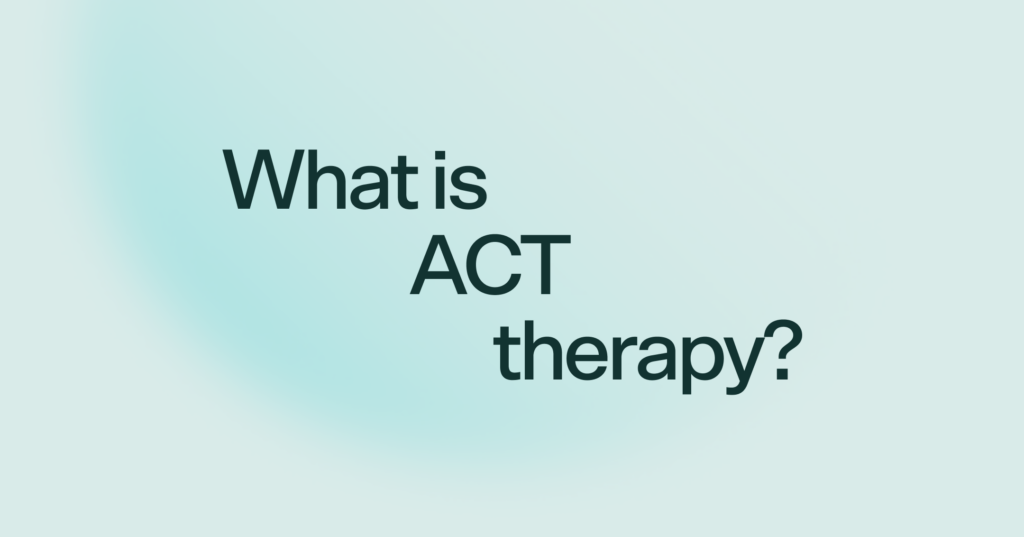Acceptance and commitment therapy (ACT) teaches people to accept their thoughts, emotions, and circumstances, including things like pain, disappointment, and illness.
ACT is used to manage a wide range of mental and physical health conditions, including depression, chronic pain, and burnout.
With ACT, therapists use activities and interventions to teach people how to cultivate mindfulness, self-awareness, and self-acceptance.
Online therapy is a convenient and flexible way to connect people with mental health services that meet their specific needs. But with so many therapists and therapeutic approaches to choose from, starting or continuing your mental health journey can feel a bit overwhelming.
One way to help make the process more manageable is to think about what you’d like to achieve during your time in therapy.
For example, if you are interested in learning how to better navigate life’s challenges, then you may want to consider acceptance and commitment therapy (ACT). Pronounced as the word “act,” this therapeutic approach is known for helping people accept distressing thoughts and feelings so they can live more fulfilling lives.
What is acceptance and commitment therapy (ACT)?
ACT is a type of therapy that promotes healing and growth through acceptance and mindfulness. ACT teaches people to accept difficult thoughts and feelings instead of trying to control or avoid them.
Instead of feeling let down about inevitable parts of life — like pain, disappointment, and illness — people practicing ACT learn to accept those feelings without judgment and cultivate greater self-awareness and self-compassion.
ACT is founded on six core principles:
Acceptance: This means embracing your thoughts, feelings, and emotions — even the difficult ones — without trying to change them.
Cognitive defusion: By taking a mental step back, you can distance yourself from distressing thoughts and feelings and learn to view them through a more objective lens.
Being present: Shifting your attention away from internal thoughts and feelings can help you remain present and mindful of the moment.
Self-as-context: This concept suggests that our thoughts aren’t absolute truths and that people are more than their emotions, feelings, and experiences.
Values: Identifying your values and what matters in life is an important step in learning to live a meaningful and purposeful life.
Committed action: Once you understand your values, you can prioritize personal growth and healing by setting goals to create positive change.
The care you need, when you need it
Learn how Rula can support your mental health journey
What conditions can ACT treat?
ACT is an evidence-based solution for managing a wide range of mental and physical health conditions. It teaches people to acknowledge pain and distress while finding ways to cope with situations out of their control. Below are several common reasons that therapists recommend ACT.
Mental health conditions: ACT is used to manage many mental health conditions and concerns, including anxiety, depression, eating disorders, and substance use disorders. Some research suggests that ACT is just as effective as cognitive behavioral therapy (CBT) for treating depression and other mental health conditions.
Physical health issues: ACT is also used to help people who have issues like chronic pain, diabetes, and cancer learn how to manage distress and discomfort.
Burnout and stress: ACT provides people with the skills and tools to manage stress and reduce the risk of burnout associated with work and school. For example, some research shows that ACT can reduce psychological distress in healthcare workers.
What can you expect from ACT?
Similar to other types of individual therapy, ACT typically begins with a conversation about your therapy goals. But with ACT, your therapist will also help you establish your core values and beliefs, as well as strategies to help you meet your goals.
Each person’s experience with ACT will largely depend on their needs and goals. For most people, ACT consists of 1-hour sessions over a period of 8 to 16 weeks. And often, the therapist will assign tasks to help people practice acceptance and other ACT skills between sessions.
With ACT, therapists use a variety of interventions and activities to teach mindfulness, increase self-awareness, and encourage self-acceptance. For example, The Life Compass is a worksheet that encourages people to reflect on what’s important to them and which areas of their life may benefit from more attention.
Another exercise designed to help people cultivate mindfulness and cognitive defusion is called Leaves on a Stream. With this exercise, people are asked to imagine they’re sitting next to a stream with leaves floating by. Each leaf represents a thought, and you learn to observe those thoughts without judgment as they float down the river.
Find care with Rula
When it comes to choosing the right type of therapy for your mental health goals, there are many factors to consider. But the first step in finding the right support is getting an accurate diagnosis from a mental health professional.
At Rula, we collaborate with an extensive network of behavioral therapists who are experienced in ACT and many other treatment types. We can help you find the right therapist for your unique needs so that you can receive care via our virtual platform as soon as tomorrow. Plus, we’ll make sure the therapist takes your insurance and is accepting new clients.
Rula's editorial process
Rula's editorial team is on a mission to make science-backed mental health insights accessible and practical for every person seeking to better understand or improve mental wellness.
Members of Rula’s clinical leadership team and other expert providers contribute to all published content, offering guidance on themes and insights based on their firsthand experience in the field. Every piece of content is thoroughly reviewed by a clinician before publishing.




